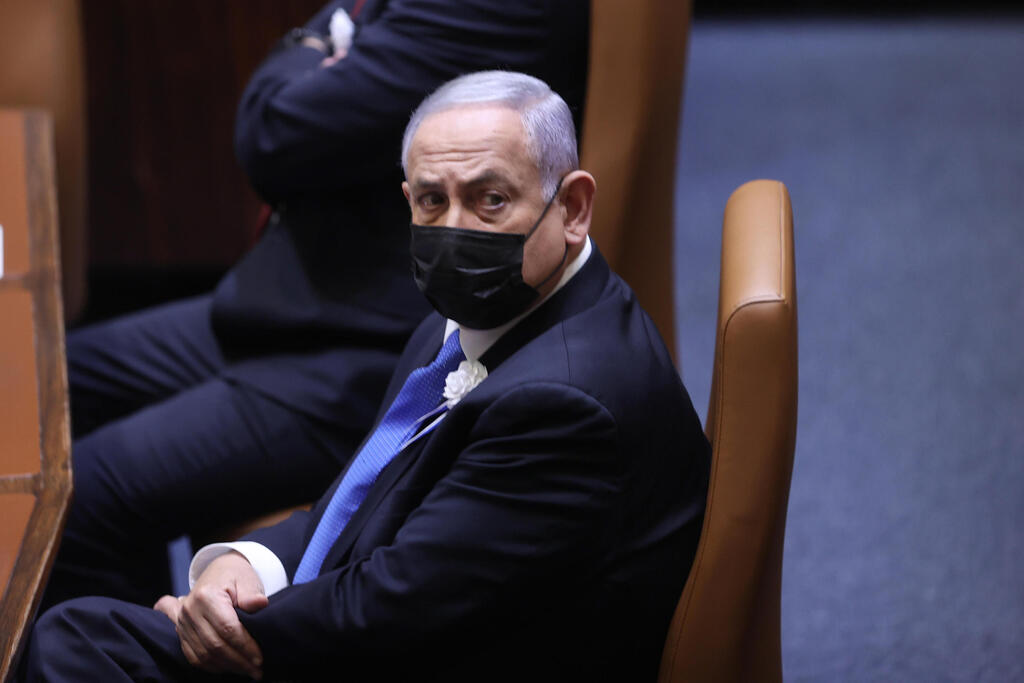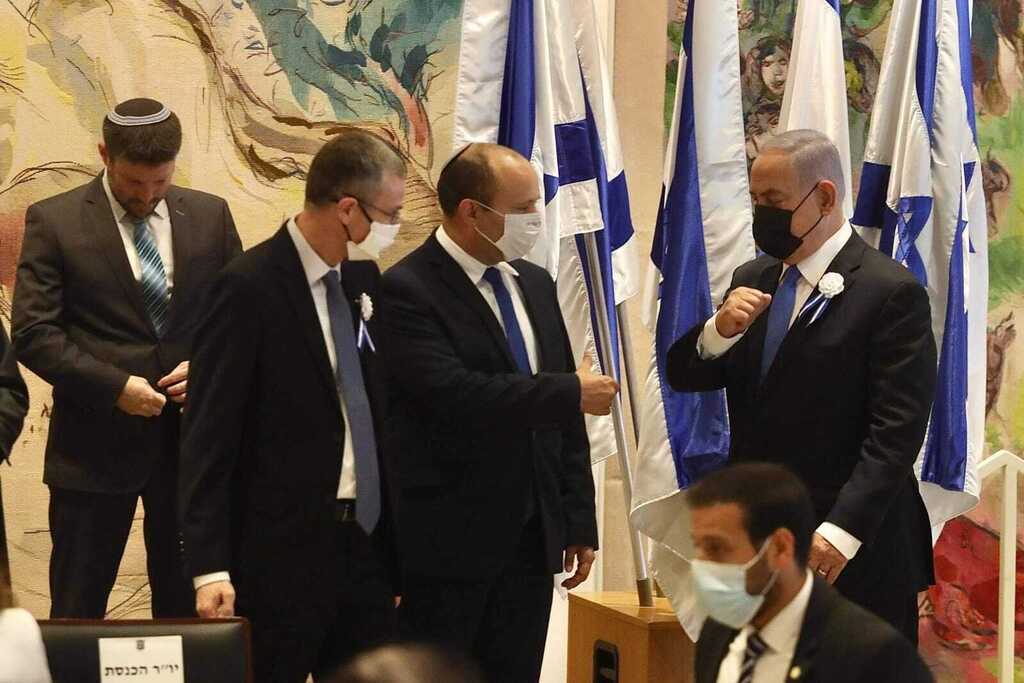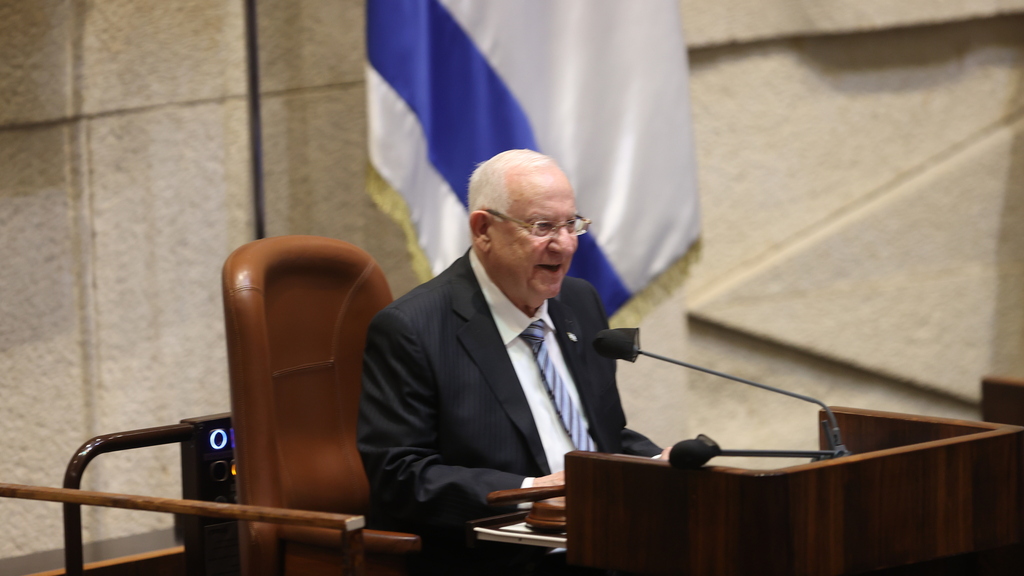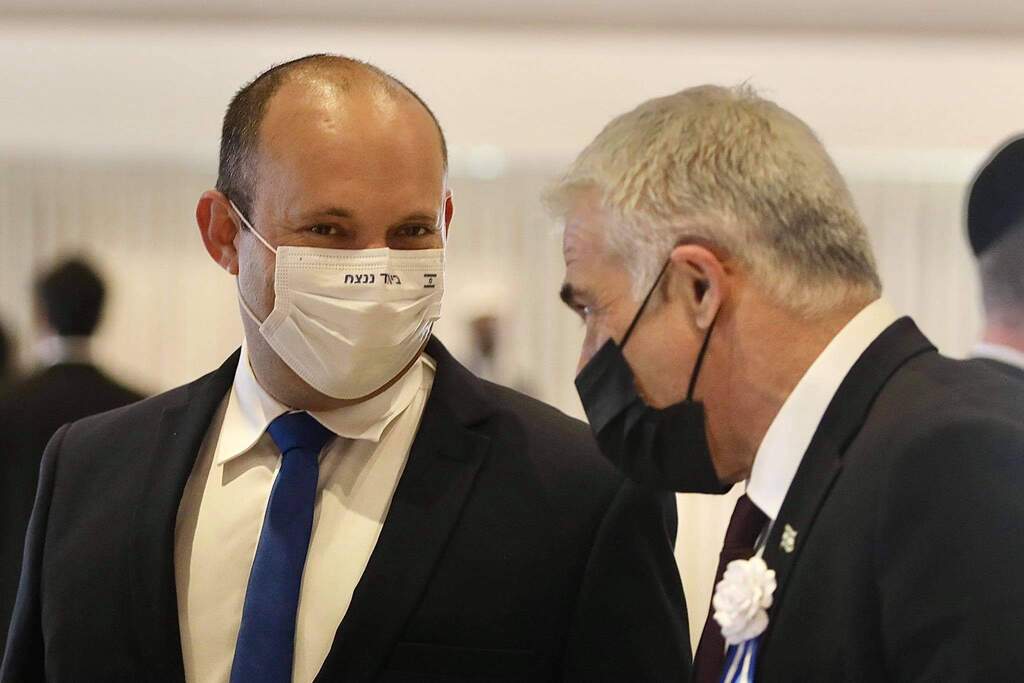Getting your Trinity Audio player ready...
Prime Minister Benjamin Netanyahu began work Wednesday on the formation of a new government, a day after President Reuven Rivlin reluctantly acknowledged that he had the best chance of cobbling together a coalition and tasked him with the job.
In the coming 28 days allotted to him, the prime minister will try to maintain his partnership with "natural allies" who recommended him for the premiership, court Yamina leader Naftali Bennet, who did not endorse him to Rivlin on Monday, and try to do what currently seems impossible - find nine more Knesset members to give him a majority of 61.
4 View gallery


Prime Minister Benjamin Netanyahu during the opening session of the 24th Knesset
(Photo: Alex Kolomoisky)
Netanyahu was Wednesday set to begin coalition talks with the ultra-Orthodox Shas and United Torah Judaism parties and the far-right Religious Zionist, while on Thursday he was due to meet with Bennett in an effort to persuade him not to form a government with the anti-Netanyahu bloc led by Yesh Atid chair Yair Lapid.
New Hope leader Gideon Saar, the Netanyahu critic who quit Likud to form his own party, was not invited to any coalition talks with Likud or the prime minister.
Netanyahu was greeted with cheers as his Likud faction met Tuesday morning, a day after the new parliament was sworn in.
At the start of the session, the prime minister said that he was given the mandate to form a government "thanks to the more than one million voters who once again ensured the Likud remains the biggest party by a margin, and thanks to the other million people who voted for the other parties who want me to continue leading" the country.
"We will make every effort to justify your vote and move Israel away from the threat of a fifth election [since April 2019]. We will form a strong government for all citizens of Israel. Not a paralyzed government, but an active one," he told the Likud MKs.
4 View gallery


L-R: Religious Zionist party leader Betzalel Smotrich, Knesset Speaker Yariv Levin, Yamina head Naftali Bennett and Prime Minister Benjamin Netanyahu at the opening of parliament on Tuesday
(Photo: Marc Israel Sellem)
Towards the end of the meeting, when the cameras and reporters left, Netanyahu reassured his faction members of his confidence in being able to form a coalition.
"It is not an easy task, but also not an impossible one," he said. "The objective is achievable. I believe we will be able to do this."
Likud MKs lambasted Rivlin for expressing his reservations about tapping Netanyahu and for doing so without inviting the prime minister to a traditional ceremony at the president's official residence.
Rivlin also decided to skip the traditional picture taken at the opening of every new Knesset with party leaders, the Knesset speaker, the prime minister and the chief justice.
"I know the position held by many, that the president should not give the role to a candidate who is facing criminal charges, but according to the law and the decision of the courts, a prime minister can continue in his role even when he is facing charges," Rivlin said in a televised address from his Jerusalem residence Monday.
But, he said, the decision "on the substantive and ethical question of the fitness of a candidate facing criminal charges to serve as prime minister" was not his to make.
"The President of the State of Israel is not a substitute for the legislature or for the judiciary," Rivlin said.
4 View gallery


President Reuven Rivlin speaking at the opening session of the 24th Knesset
(Photo: Alex Kolomoisky)
During the Likud faction meeting Wednesday, Transportation Minister Miri Regev lashed out at the president, saying that "it was not surprising" that he did not want to be in the traditional photo taken at the start of the Knesset's opening session.
Regev accused Rivlin of acting "with complete disregard for statesmanship and out of ego," recalling the president's decision not invite the prime minister to Independence Day ceremonies at his residence, which she said was "completely against protocol."
Ministers Yuval Steinitz and Ofir Akunis voiced similar criticism, while other Likud members griped about the party's directive against talking to the media.
The meeting also discussed the possibility of a move by the anti-Netanyahu camp to oust Likud Knesset Speaker Yariv Levin, who is expected to be selective in legislation brought for a vote, in particular as Netanyahu's opponents have begun efforts to block him from remaining as prime minister.
Yisrael Beytenu has presented draft legislation on term limits for prime ministers and barring an indicted member of the Knesset from serving as prime minister. Netanyahu has been in power since 2009 and is currently on trial for fraud, bribery and breach of trust.
Talk of replacing Levin in order to fast-track this possible legislation have also been voiced within the Knesset halls.
4 View gallery


Yamina head Naftali Bennett and Yesh Atid leader Yair Lapid
(Photo: MArk Israel Salem)
Likud is reportedly planning to pressure Religious Zionist party leader Betzalel Smotrich and Yamina head Naftali Bennett over the coming days to stand by Netanyahu no matter what.
Smotrich said he would refuse to be part of a government supported in any way by the Islamist Ra'am party, whose four seats could help to keep the prime minister in his seat, while Bennett has refrained from pledging his loyalty to former ally Netanyahu. Bennett mustered seven endorsements to form the next government
During a Yamina faction meeting Tuesday, Bennett said: "Israel now needs two things. The first is the formation of a stable government to save the country from a fifth election and the endless downward spiral of chaos and hate. The second is a government which will reflect more or less the varied opinions in the public, a national consensus, that is – one that leans towards the right-wing. I take upon myself the responsibility for forming such a government."

